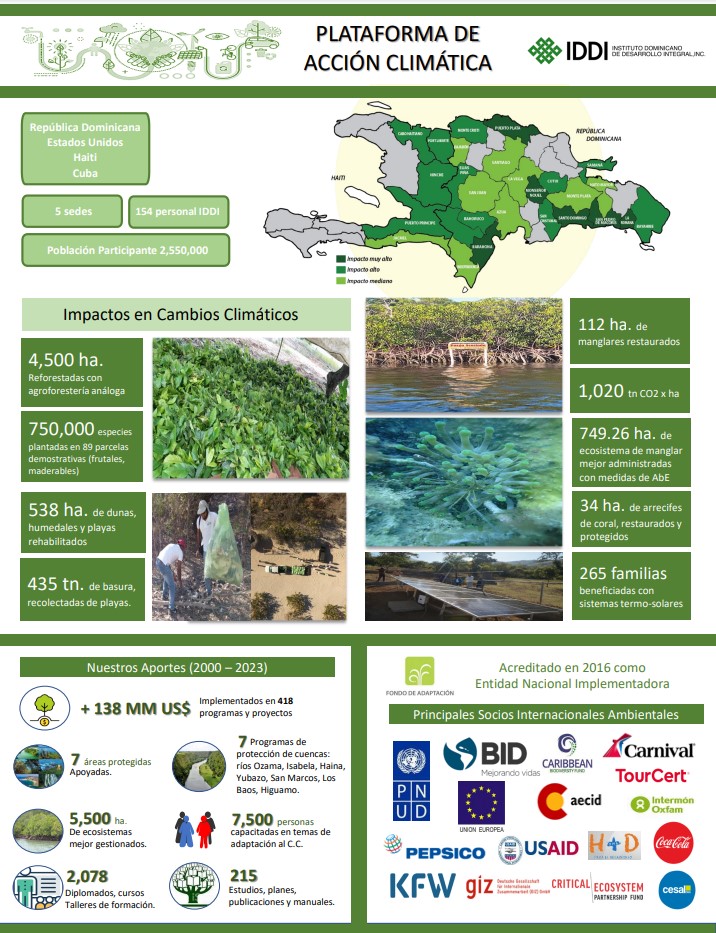Medio Ambiente y Acción Climática
Plataforma de Acción Climática del IDDI
República Dominicana, en su condición de Pequeño Estado Insular en Desarrollo (SIDS), se encuentra expuesta a diversas amenazas recurrentes, la mayoría de ellas derivadas de eventos climáticos tales como huracanes, tormentas, inundaciones, incendios, periodos de sequías y epidemias, además de eventos sísmicos como terremotos y deslizamientos de tierra. República Dominicana está en el puesto número 11 en el índice Mundial de Riesgo Climático 2017, y se ubica entre las 10 naciones más afectadas por estos fenómenos climáticos entre 1997 y 2016. Este panorama se ve exacerbado en las ciudades debido a la migración interna y externa, presión sobre los recursos naturales, crecimiento poblacional e industrialización, lo que representa un desafío particular para la gestión de riesgos climáticos en contextos urbanos.
En este contexto, la adopción del Acuerdo de París en 2015 colocó al mundo en un camino ambicioso y esencial hacia el desarrollo resiliente y libre de carbono.
El IDDI, a través de su Plataforma de Acción Climática, y su Centro de Cambio Climático y Desarrollo Sostenible (CCDS), fundado en 2011, se alinea al Acuerdo de Paris y el compromiso de Republica Dominicana a través de la Contribución Nacional Determinada (NDC-RD), como Entidad Nacional Implementadora (NIE) del Fondo de Adaptación, y persigue los siguientes objetivos:
Educar y difundir los conocimientos sobre Cambio Climático, Adaptación y Mitigación.
Formular y promover proyectos de acción climática y canalización de fondos con enfoques innovadores.
Fortalecimiento de las capacidades de los actores públicos, privados y de la sociedad civil, a través de la creación y promoción de entidades como la Coalición Nacional de Ciudades Resilientes (CNCR), que busca el empoderamiento municipal en la acción climática.
Incidencia en políticas públicas (Ley de Cambio Climático y Ley de Residuos Sólidos).
Innovación tecnológica para la Adaptación y Mitigación del Cambio Climático (actualmente entornos costero-marinos).
Promover la investigación.
Fortalecer los mecanismos de transparencia climática.
Incidencia en políticas públicas (Ley de Cambio Climático y Ley de Residuos Sólidos).
Innovación tecnológica para la Adaptación y Mitigación del Cambio Climático (actualmente entornos costero-marinos).
Promover la investigación.
Fortalecer los mecanismos de transparencia climática.
República Dominicana, en su NDC 2020, aumenta su ambición climática al comprometerse a la reducción de un 27 % de las emisiones de GEI con respecto al BAU o business as usual al 2030. Se presentan 46 opciones de mitigación distribuidas en: (i) 27 opciones identificadas y evaluadas para el sector de Energía (enfocadas en generación de electricidad, eficiencia energética y transporte carretero), 4 opciones identificadas y evaluadas para el sector de Uso de Productos y Procesos Industriales (IPPU), 10 opciones identificadas para los sectores de Agricultura, Silvicultura y Otros Usos del Suelo (AFOLU) y 5 para el sector Desechos. El país propone lograr, a partir de opciones de mitigación evaluadas y propuestas, reducir 13,853.71 Gg CO2eq lo que representa 27.16 % con respecto al escenario BAU 2030 estimado en 51 mil Gg CO2eq, con una inversión requerida estimada de USD $ 8,916,950,000.00 expresada de forma condicionada e incondicionada.
No obstante, Republica Dominicana, por su condición de Pequeño Estado Insular en Desarrollo (SIDS), enfoca su acción climática sobre todo en la Adaptación, que se refiere a los ajustes en los sistemas ecológicos, sociales o económicos que deben efectuarse ante cambios actuales y previstos del clima, y sus efectos. Se centra en los cambios en los procesos, prácticas y estructuras para reducir los daños potenciales o para beneficiarse de las oportunidades asociadas con el cambio climático. Algunos de estos impactos, como sequías, inundaciones, ciclones, la subida del nivel del mar o las temperaturas extremas, ejercen fuertes presiones sobre el desarrollo socioeconómico de la sociedad.
Debido a los cambios esperados en la frecuencia, magnitud y duración de los fenómenos climáticos adversos, el enfoque del IDDI se centra en el desarrollo sostenible de sectores que, como la agricultura, los recursos forestales, los recursos hídricos, la seguridad alimentaria, los recursos costero-marinos, el turismo, la salud, el medio ambiente y los medios de subsistencia, son muy sensibles al cambio y a la variabilidad del clima, con el fin de aumentar su resiliencia.
Las soluciones de adaptación adoptan muchas formas y modalidades, dependiendo del contexto único de una comunidad, empresa, organización, país o región. No existe una solución única. Por ello, el IDDI, como actor neutral, se centra en la movilización de actores y la canalización de fondos para la gestión de los riesgos climáticos desde las políticas y los marcos institucionales y regulatorios, el fortalecimiento de las capacidades locales y nacionales, y el desarrollo de instrumentos tales como estudios de vulnerabilidad y riesgo climático, mecanismos de financiamiento y seguros climáticos, y la identificación de medidas y enfoques tales como:
Gestión integral del recurso hídrico
Resiliencia de las ciudades
Adaptación basada en Ecosistemas (EbA)
Agricultura Climáticamente Inteligente
Turismo Sostenible
Gestión Integral de Residuos Solidos
Energia
Transporte y movilidad
Finanzas y Seguros Climáticos
Transparencia Climática
Infraestructura resiliente al CC
Innovación Tecnológica para el Cambio Climático
El IDDI está trabajando arduamente para contribuir a la transformación del ser humano, su familia y la comunidad en que vivimos.
Ante un problema común la solución somos todos.



